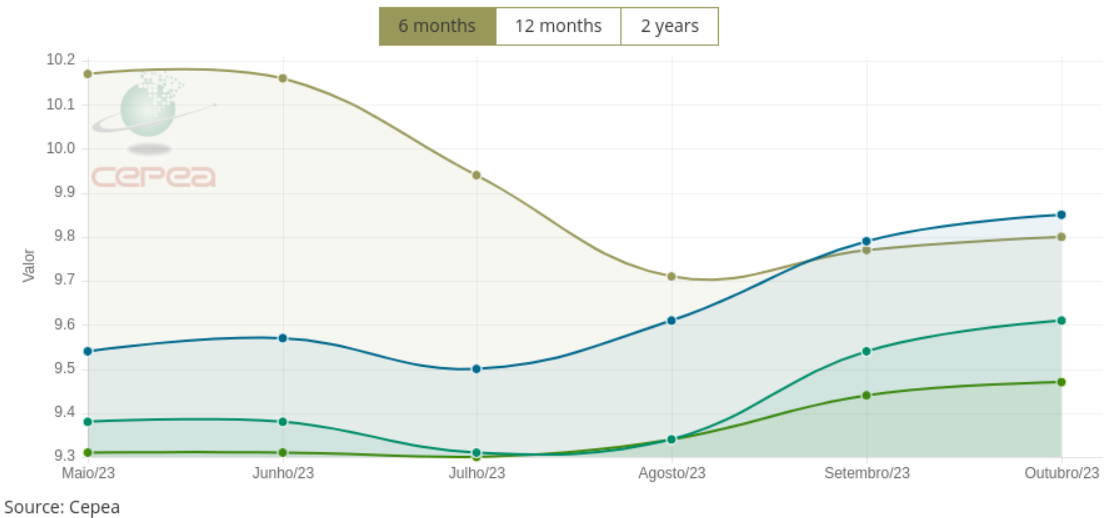|

Image: AgroNews / FIS
Brazilian tilapia market
 BRAZIL
BRAZIL
Tuesday, October 17, 2023, 01:00 (GMT + 9)
Import of tilapia from Vietnam worries Brazilian producers
In this week's analysis, we will dive into the latest information about the tilapia market in Brazil, bringing to light up-to-date and relevant data
.png)
Source: Stockfile FIS
Follow tilapia prices in different regions, changes in tambaqui prices, and the situation with tilapia imports from Vietnam, which has been a topic of discussion and concern.
Tilapia Market
In Brazil, the tilapia market is always in flux, with price variations in different regions. Starting with the Grandes Lagos, which comprise Mato Grosso do Sul and São Paulo, we recorded an
increase of 1 cent in the average price per kilo of tilapia, which now stands at R$ 9.81 (USD 1.94).

In the state of Paraná, more specifically in the northern region, there was an increase of R$ 0.05 (USD 0.0099), causing the average price to reach R$ 9.90 (USD 1.96) per kilo. In the western region of Paraná, the increase was R$ 0.02 (USD 0.004), and the average price reached R$ 9.63 (USD 1.90). Leaving Paraná towards Minas Gerais, in the Morada Nova de Minas region, we had an increase of R$ 0.02 (USD 0.004), resulting in an average price of R$ 9.49 (USD 1.87). This short week surprised us with a slightly higher demand, which had a positive impact on prices.
Native fish market
In the Amazon region, the drought has affected the capture of tambaquis. Specimens weighing more than three kilos are in high demand, resulting in a recovery in prices. However, smaller tambaquis, especially those in the two-kilo range, maintained stable prices.

Importing Tilapia from Vietnam
The issue of importing tilapia from Vietnam has raised concerns in the sector. The previous week, there was mobilization with the ministry and government to discuss the situation. The ministry, whose mission is to defend the national productive sector, took action.
.png)
However, in the following week, no statements were issued and there was no news of concrete actions from the ministry. This lack of positioning is worrying, since imports can directly affect national producers, especially those who process, but do not produce, tilapia. The community involved is already mobilizing for more effective actions next week, aimed at protecting national interests.
.png)
Source: Stockfile FISS
The Brazilian Fish Farming Association – Peixe BR, even issued an official statement regarding the consequences that could affect national producers.
Note from Peixe BR:
“PEIXE BR announces that it is engaged in the fight against the import of tilapia from Vietnam and any other country.
The tilapia production chain is a new and, therefore, developing activity, which involves thousands of companies and producers – 98% of which are small.

Source: AgroNews
The sector generates more than 1 million jobs and income in all Brazilian states.
We do not accept that the Brazilian government opens the market to the entry of tilapia, given that we have all the capacity to supply and supply safe, high-quality food.
In addition to the economic risks to Brazilian tilapia, imports imply obvious health risks and this could compromise the activity in Brazil in addition to being harmful to consumers.
.png)
Brazilian tilapia is one of the best in the world, produced with good practices and safety.
PEIXE BR is in permanent contact with the Ministry of Fisheries and Aquaculture. We ask Mr. minister André de Paula clear position in defense of national tilapia and against the entry of products from abroad.
We would like to take this opportunity to inform you that, at this time, no registration process for a tilapia processing plant or any other country in the world is being processed at the Ministry of Agriculture and Livestock.
Therefore, we advise Brazilian companies not to negotiate with importers who use this argument to pressure tilapia prices in the country.
This is a priority topic for PEIXE BR. As an entity defending the farmed fish production chain, we will do everything in our power to defend Brazilian tilapia.”
This summary of the tilapia market in Brazil offers a bird's eye view of recent price changes and demand trends. The situation of tambaquis in the Amazon region, affected by drought, also deserves attention, with a clear distinction between larger and smaller specimens.
Uncertainty regarding importing tilapia from Vietnam is a matter of concern as it could negatively affect the domestic industry. We will continue to closely monitor market developments and government actions.
Author: Vicente Delgado | AgroNews (Traslated from the original in Portuguese)

[email protected]
www.seafood.media
|



